Why Were Scientists Skeptical of the Atomic Bomb?

You're exploring why scientists were skeptical of the atomic bomb, and it's largely due to the immense moral and ethical dilemmas. They were concerned about the unprecedented destructive power that contradicts scientific integrity. Scientists struggled with their patriotic duty against their ethical beliefs. There was fear of mass destruction altering warfare dynamics and heightening global political tensions. Long-term environmental impacts and the potential escalation into a global arms race were serious worries. Uncertainties about the bomb's technology added to their apprehension. To understand the depth of these concerns, consider the broader implications of wielding such power.
Moral and Ethical Concerns
Often, the moral and ethical concerns surrounding the atomic bomb stem from its unprecedented destructive power and the massive loss of life it can cause. As you investigate the historical context, you'll see how scientists in the 1940s grappled with these issues, questioning if the pursuit of such devastating technology aligned with scientific integrity. Many of them believed that creating a weapon capable of annihilating entire cities contradicted the fundamental principles of science, which aim to improve human life, not destroy it. This sentiment mirrors the challenges faced when confronting pseudoscientific claims, where scientific principles are often misrepresented or ignored.
You might wonder how these scientists reconciled their roles in the Manhattan Project with their ethical beliefs. For many, it was a challenging balance between their patriotic duty and their moral compass. The collaboration was born out of necessity during World War II, but it raised profound questions about the responsibility of those who possess such powerful knowledge. They faced dilemmas about whether their work would ultimately serve humanity or doom it.
As you investigate further, consider how these ethical concerns still resonate today. The legacy of the atomic bomb continues to provoke debate about scientific integrity and the moral obligations of researchers wielding tremendous technological power.
Fear of Mass Destruction
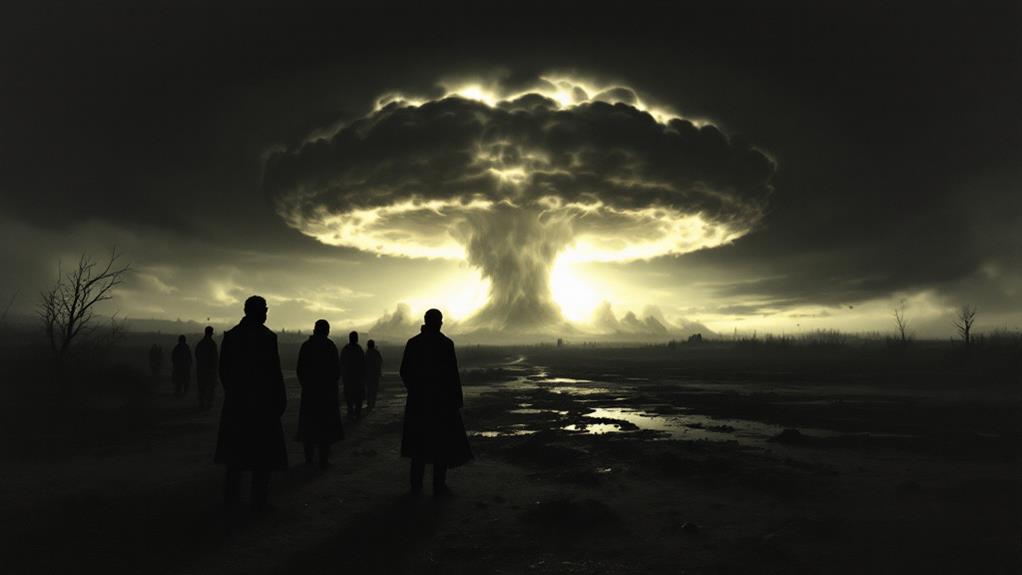
The moral and ethical concerns of scientists in the 1940s naturally fed into a broader fear of mass destruction. As a scientist, you might have felt the weight of scientific integrity pressing against the potential to release unprecedented devastation. The atomic bomb wasn't just another weapon; it represented a shift in warfare that could obliterate entire cities and millions of lives in seconds. You'd worry about the societal implications of wielding such power—could humanity responsibly manage this terrifying force? Just as schizophrenia requires careful management to mitigate its profound impact on reality perception, the atomic bomb demanded a similar level of responsibility to prevent catastrophic outcomes. Historically, scientific advancements aimed to improve life, but the atomic bomb flipped that notion. You'd question if your contributions were leading to progress or paving the path to annihilation. Warnings about a future dominated by fear and arms races filled your mind. The possibility that one nation's possession of atomic weapons could compel others to develop their own was a chilling thought. This arms race could overshadow scientific integrity, as nations prioritized power over ethics. In facing these fears, you'd grapple with your role in a world where science could either protect or destroy. The choice wasn't just personal; it carried profound societal implications that could define the fate of future generations.
Long-term Environmental Impact
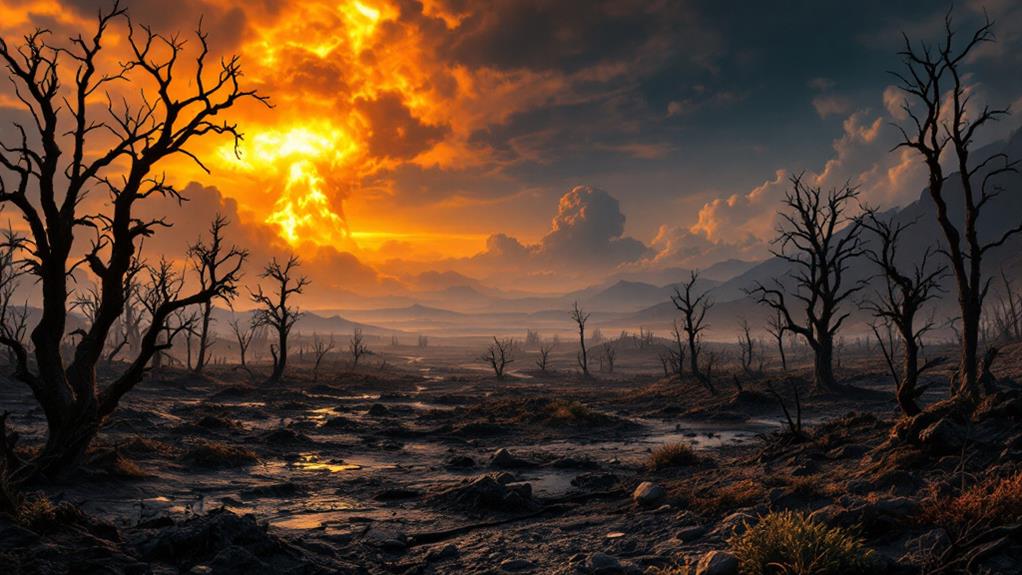
Amid the ethical dilemmas, you'd also confront the long-term environmental impact of the atomic bomb. The radiation exposure resulting from its detonation poses severe ecological consequences that can't be ignored. Wildlife disruption is one immediate effect, as animals and plants within the vicinity of the blast are either destroyed or severely affected. This disruption leads to a cascade of changes within ecosystems, contributing to biodiversity loss over time.
You'd notice how soil contamination becomes a critical issue, as radioactive particles settle into the ground, affecting plant growth and making the land unsafe for human use. This contamination doesn't just stop at the soil; it leeches into water sources, degrading water quality and impacting both aquatic life and human health.
Considering resource depletion, the materials and energy required to develop and test atomic bombs draw heavily on natural resources, which could be otherwise used sustainably. The climate effects add another layer of concern, as atmospheric changes from repeated testing alter weather patterns and contribute to global warming.
In essence, the atomic bomb's environmental impacts are far-reaching, sparking valid skepticism among scientists who understood that its legacy extends well beyond immediate destruction.
Political and Global Risks
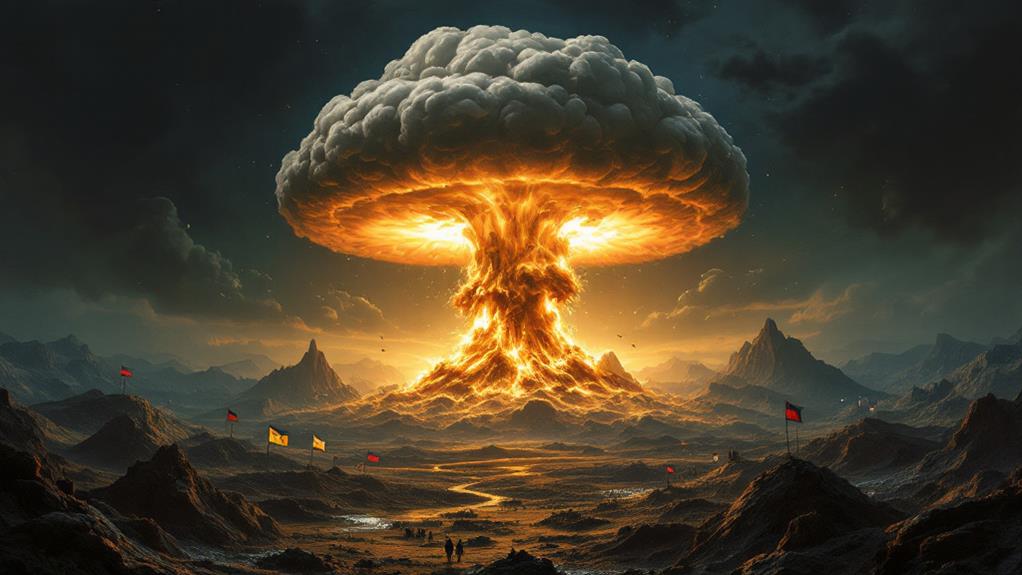
You can't ignore the political and global risks that come with the creation and deployment of the atomic bomb. As a decision-maker or observer in this arena, you're aware that the bomb doesn't just shift military power; it transforms diplomatic dynamics too. The introduction of such a destructive weapon heightens diplomatic tensions, as countries scramble to either develop their atomic capabilities or seek protection from those who have them. These tensions can easily escalate, leading to strained relationships and potential conflicts among nations.
Moreover, the atomic bomb redefines global alliances. Countries might feel compelled to align themselves with nuclear-capable states, hoping to secure their own safety under a protective umbrella. This reshaping of alliances can destabilize existing international order and create uncertainty in global politics. You find yourself questioning if these alliances are genuine partnerships or simply strategic moves prompted by fear of annihilation.
As you navigate these complexities, consider the profound impact on global governance. The atomic bomb challenges traditional diplomacy, forcing nations to rethink their strategies in a world where a single misstep could have catastrophic consequences. The stakes are unprecedentedly high, and you must weigh these risks carefully.
Scientific Responsibility

Recognize that beyond political and global risks, the atomic bomb raises questions about scientific responsibility. As a scientist, you must consider the ethical implications of your work. The development of the atomic bomb exemplifies this challenge. When scientists contributed to its creation, they weren't just advancing knowledge; they were changing the course of history. This responsibility demands scientific accountability—making certain that the implications of your research align with ethical standards and the greater good.
You grapple with decisions that could have profound impacts on humanity and the planet. It's vital to weigh the benefits of scientific advancements against potential harm. The atomic bomb, while a technological marvel, posed questions about the morality of its use and the suffering it could unleash. As part of your responsibility, you must anticipate how your findings might be used, considering the long-term consequences.
Engaging in open dialogues with colleagues and the public about the ethical implications of your work fosters awareness and accountability. By doing so, you help guarantee that scientific progress doesn't come at the cost of human values. Your vigilance and dedication to ethical research guide the responsible use of science in society.
Potential for Nuclear Arms Race
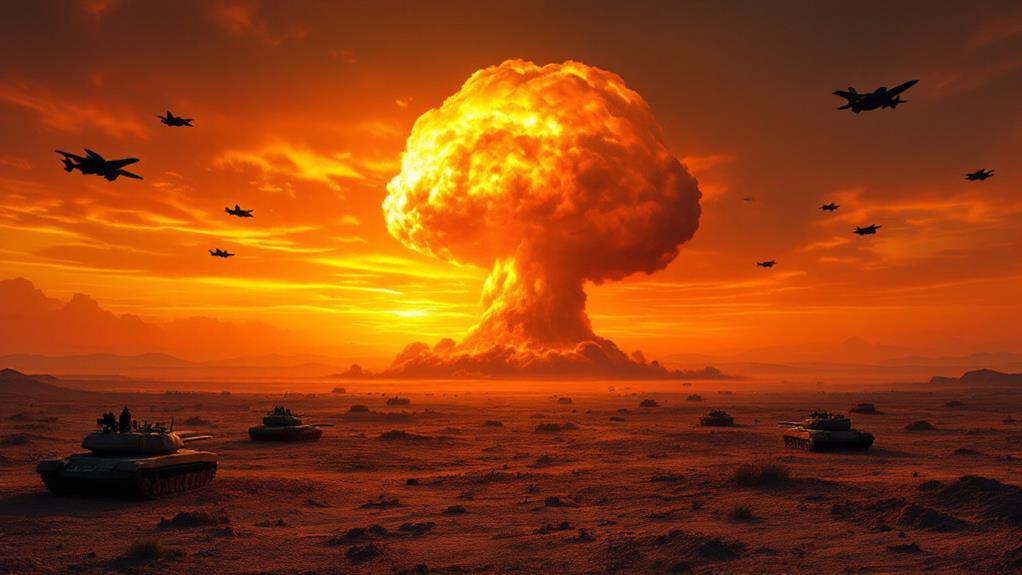
The development of the atomic bomb didn't just alter warfare; it sparked the looming threat of a nuclear arms race. As a scientist, you might feel the weight of responsibility knowing that your work could lead to nuclear proliferation. This wasn't just about one nation gaining power; it was a catalyst for other countries to pursue similar capabilities. The fear wasn't just hypothetical; it was rooted in the reality that once one country possesses such destructive power, others feel compelled to catch up, escalating geopolitical tensions.
You'd be acutely aware that this race could spiral out of control. Imagine a world where every major country possesses nuclear weapons—each one on edge, each one fearing the other. The balance of power would shift dramatically, and any minor conflict could potentially escalate into a catastrophic nuclear exchange. Your concerns would be amplified by the knowledge that nations might prioritize military might over diplomatic solutions.
Scientists like you worried that the atomic bomb wouldn't just end a war but would start a perpetual cycle of fear and competition. You'd see the potential for destruction as almost limitless, urging caution and restraint in the face of unprecedented power.
Uncertain Technological Outcomes

Amid the groundbreaking development of the atomic bomb, scientists faced the unsettling reality of uncertain technological outcomes. You can imagine the immense pressure they felt, working on something so unprecedented. Their experiments were fraught with limitations. Many of the processes involved were theoretical, never tried in practical settings at such a massive scale. It wasn't just about splitting atoms; it was about understanding how these reactions could behave under different conditions, something they hadn't fully grasped.
Unpredictable reactions were a constant concern. You'd be dealing with materials and energy levels that could behave erratically. The scientists wondered if they'd control the chain reactions or if they'd release forces beyond their intentions. They knew the stakes were high, but the science was still emerging. The fear wasn't just about whether the bomb would work, but how it would work. Would it generate the expected yield, or would it spiral into a catastrophic failure?
These uncertainties made scientists skeptical. They were treading on new ground, where each step had the potential for unintended consequences. You'd be cautious too, knowing that the entire world could be affected by your calculations and predictions.
Impact on Warfare Dynamics
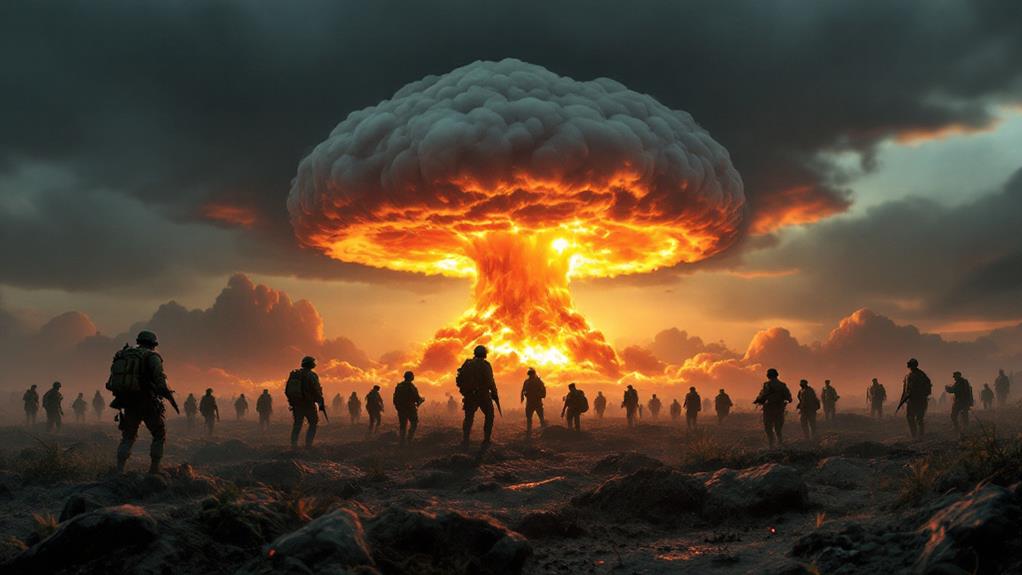
In the aftermath of the atomic bomb's creation, warfare's dynamics shifted dramatically. You've entered a period where nuclear strategy became essential, redefining how nations approached conflict. The very nature of warfare evolution turned on its head; instead of focusing solely on conventional arms, countries now had to contemplate the catastrophic potential of nuclear weapons. This shift demanded new military doctrines, where deterrence and mutually assured destruction became central themes.
As you navigate this new landscape, you realize that nuclear strategy involves more than just possessing the bomb. It's about understanding the power dynamics and the delicate balance required to prevent total annihilation. Nations scrambled to develop their own arsenals, triggering a global arms race that altered political alliances and military tactics. The sheer destructive power of these weapons forced a reevaluation of traditional warfare, leading to strategies that prioritized diplomacy and de-escalation over direct confrontation.
Your understanding of warfare evolution must now include the constant threat posed by nuclear weapons. In this new world order, the stakes are higher, and the consequences of miscalculation are more severe, forever altering how wars are fought and prevented.



